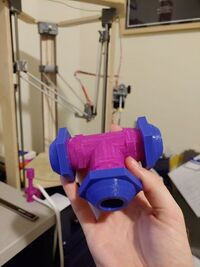Title of the device or system
Project developed by nate.evink
Template:Statusboxtop Template:Status-design Template:Status-prototype You can help Appropedia by contributing to the next step in this OSAT's status. Template:Boxbottom
Abstract
Accessing clean water is still a struggle for many people throughout the world. In areas devastated by natural disasters, it can take years for the infrastructure to be rebuilt. Makeshift water piping has been a massive undertaking in Nepal especially where an earthquake devastated the area a year ago. Organizations such as Field Ready are hard at work making sure water supply systems in the area are sanitary and helpful for those who need it. The T-fitting module was specifically requested by Field Ready to join hoses in the field to allow for more pipes to be ran while the entire system staying sanitary. The request Source can be found here.

Bill of Materials
- PLA Filament was used for printing all components. Components should be printable in other materials as well.
- All CAD models (STLs and SCAD) can be found on Youmagine.
- One T Fitting (Printed Component)
- Cost: $1.12 for 56g of PLA Filament at $20/kg
- Three Hose Caps (Printed Component)
- Cost: $0.34 for 17g of PLA FIlament at $20/kg each
- O-Ring and Washer
- Already equipped with manufacturing O-rings for hoses as indicated here.
- Equivalent Market Cost $1.48 for 6 of each
- Link to STLs and SCAD Files
Tools needed for fabrication of the OSAT
- MOST Delta RepRap or similar RepRap 3-D printer
- Sharp knife to remove excess filament from threads
Skills and Knowledge Necessary to Make the OSAT
- Knowledge of operating a 3D printer is required for manufacturing components.
Technical Specifications and Assembly Instructions
Print Instructions
Material: PLA
Layer Height: 0.3mm
Shell Thickness: 2mm
Fill Density: 25%
Print Speed: 50 mm/s
Printing Temperature: 210 C
- Print time estimate: 5 hours
- T Fitting: 2.5 hours
- Hose Cap: 50 minutess each
Assembly Instructions
- 3-D print all components
- Support material should be disabled to reduce waste plastic. The design prints fine without but using support may improve quality of parts.
- Insert O-ring and Crush Washer into T Fitting
- Slide Hose Cap over hose and feed hose into T fitting
- Tighten Threads on hose cap to crush washer into O ring and create seal

Common Problems and Solutions
- Make sure retraction is enabled when printing components. If parts have extra plastic in threaded regions, assembly becomes difficult.
- Complete seating of hose in T fitting is important to ensure a good seal.
Cost savings
- One T Fitting Cost: $1.12 for 56g of PLA Filament at $20/kg
- Three Hose Caps Cost: $0.34 for 17g of PLA FIlament at $20/kg each
- O-Ring and Washer Cost: $1.48 for 6 of each
- Total Cost: $2.20
- Equivalent Commercial Product: $8.78
- Cost Savings: $6.58 (Reduction of 74.943%)
Benefited Internet Communities
- Communities that would benefit from device
- Field Ready
- MakerNet Alliance
- Global Humanitarian Lab
References
- The sources of information (e.g. engineering handbooks, journal articles, government documents, webpages, books, magazine articles etc.). References should use the <ref> </ref> and <references/> tags and can be in any format but should include all the information necessary for someone else to find the same information you did. For example: [1]
- ↑ web page: Department of Energy (DOE) Landscaping and Energy Efficiency, DOE/GO-10095 (1995) Available: http://www.eren.doe.gov/erec/factsheets/landscape.html
Based on the developmental needs addressed (e.g. food, heat, electricity, clean water, health care, etc.) be sure to label your device in the proper categories e.g. use [[Category:Water]]. Be sure to categorize your device so that it will be easy to find – for example “Low voltage connection basics” is categorized in [[Category:How tos]] [[Category:Electricity]] [[Category:Electric lighting]].